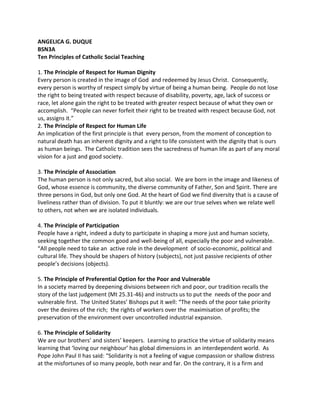
Ten principles of social teaching
- 1. ANGELICA G. DUQUE BSN3A Ten Principles of Catholic Social Teaching 1. The Principle of Respect for Human Dignity Every person is created in the image of God and redeemed by Jesus Christ. Consequently, every person is worthy of respect simply by virtue of being a human being. People do not lose the right to being treated with respect because of disability, poverty, age, lack of success or race, let alone gain the right to be treated with greater respect because of what they own or accomplish. “People can never forfeit their right to be treated with respect because God, not us, assigns it.” 2. The Principle of Respect for Human Life An implication of the first principle is that every person, from the moment of conception to natural death has an inherent dignity and a right to life consistent with the dignity that is ours as human beings. The Catholic tradition sees the sacredness of human life as part of any moral vision for a just and good society. 3. The Principle of Association The human person is not only sacred, but also social. We are born in the image and likeness of God, whose essence is community, the diverse community of Father, Son and Spirit. There are three persons in God, but only one God. At the heart of God we find diversity that is a cause of liveliness rather than of division. To put it bluntly: we are our true selves when we relate well to others, not when we are isolated individuals. 4. The Principle of Participation People have a right, indeed a duty to participate in shaping a more just and human society, seeking together the common good and well-being of all, especially the poor and vulnerable. “All people need to take an active role in the development of socio-economic, political and cultural life. They should be shapers of history (subjects), not just passive recipients of other people’s decisions (objects). 5. The Principle of Preferential Option for the Poor and Vulnerable In a society marred by deepening divisions between rich and poor, our tradition recalls the story of the last judgement (Mt 25.31-46) and instructs us to put the needs of the poor and vulnerable first. The United States’ Bishops put it well: “The needs of the poor take priority over the desires of the rich; the rights of workers over the maximisation of profits; the preservation of the environment over uncontrolled industrial expansion. 6. The Principle of Solidarity We are our brothers’ and sisters’ keepers. Learning to practice the virtue of solidarity means learning that ‘loving our neighbour’ has global dimensions in an interdependent world. As Pope John Paul II has said: “Solidarity is not a feeling of vague compassion or shallow distress at the misfortunes of so many people, both near and far. On the contrary, it is a firm and
- 2. persevering determination to commit oneself to the common good; that is to say, to the good of all and of each individual, because we are all really responsible for all.” 7.The Principle of Stewardship We show respect for the Creator by our stewardship of creation. We have a responsibility to care for the world’s goods as stewards and trustees, not primarily, let alone merely, as consumers. The Queensland Catholic Bishops issued a Pastoral Letter on the Great Barrier Reef in June 2004. They write: “We are all in the process of learning how to better safeguard creation, respect the rhythms of nature and live more sustainably. In the interests of planetary health we are all called to participate in respectful dialogue, to leave a lighter ecological footprint and firmer spiritual one, so that generations yet unborn will inherit a world, in the words of the Pope, ‘closer to the design of the Creator’.” 8. The Principle of Subsidiarity The word subsidiarity comes from the Latin word subsidium which means help, aid or support. The principle of subsidiarity means being wide-eyed, clearly determining the right amount of help or support that is needed to accomplish a task or to meet an obligation: “not too much” (taking over and doing it for the other: thereby creating learned helplessness or overdependence) and “not too little” (standing back and watching people thrash about, thereby increasing frustration and perhaps hopelessness). “Instead of ‘the less government the better’, the principle might be better summarised as ‘no bigger than necessary, no smaller than appropriate’.” 9. The Principle of Human Equality Given that every human being is entitled to respect and dignity merely because she/he has been created in the image and likeness of God, it follows that there is a radical equality among all human beings. After all, as George Cladis points out: “competition is alien within God.” This principle lies close to the surface in every Australian. We talk of it in terms of giving people a fair go. 10. The Principle of Common Good A community is genuinely healthy when all people, not only one or several segments, flourish. The Russian novelist Doestoevski put it this way: “The degree of civilisation in a society can be judged by entering its prisons”. “Every social group must take account of the needs and legitimate aspirations of other groups, and even of the general welfare of the entire human family.”
